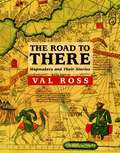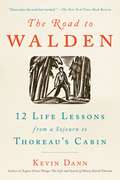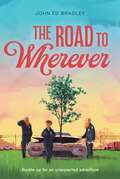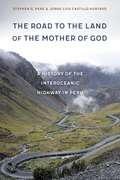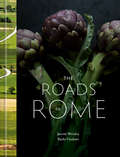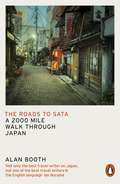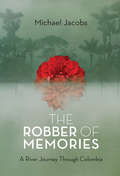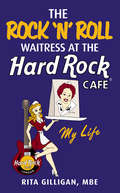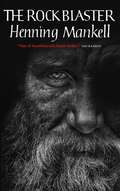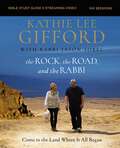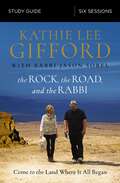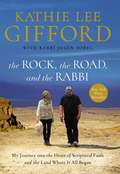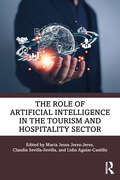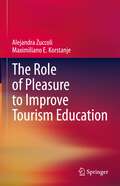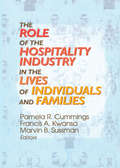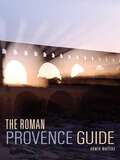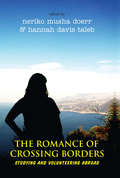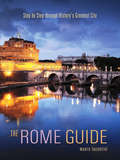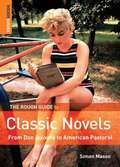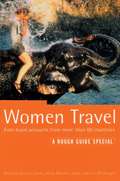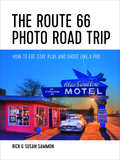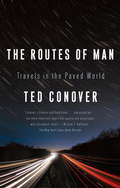- Table View
- List View
The Road to There: Mapmakers and Their Stories
by Val RossWinner of the 2004 Norma Fleck Award for Canadian children's non-fictionHonor Book for the Society of School Librarians International's Best Book Award - Social Studies, Grades 7-12Shortlisted for the Children's Literature Roundtable Information Book of the Year2003 winner of the Mr. Christie's Book Award SealShortlisted for the 2004 Norma Fleck Award for Canadian Children's Non-fictionIncluded on VOYA's ninth annual Nonfiction Honor ListSelected for inclusion in CCBC Choices 2004: the best-of-the-year list published by the Cooperative Children's Book center of the School of Education at the University of Wisconsin-MadisonNamed Notable Book by the International Reading Association's Children's Book Award in the intermediate nonfiction category Road maps; sailor's charts; quilts; songlines; gilded parchment covered with jewel-like colors; computer printouts - to guide us through the strange, vast, beautiful, and mysterious frontiers of the world of maps, Val Ross presents the men and women who made them.Here are some of the unexpected stories of history's great mapmakers: the fraud artists who deliberately distorted maps for political gain, Captain Cook, the slaves on the run who found their way thanks to specially-pieced quilts, the woman who mapped London's streets, princes, doctors, and warriors. These are the people who helped us chart our way in the world, under the sea, and on to the stars.With reproductions of some of the most important maps in history, this extraordinary book, packed with information, is as fascinating and suspenseful as a novel.From the Hardcover edition.
The Road to Walden: 12 Life Lessons from a Sojourn to Thoreau's Cabin
by Kevin DannThe acclaimed author of Expect Great Things: The Life and Search of Henry David Thoreau traverses on foot from Manhattan to Walden Pond, retracing Thoreau's steps and unlocking the practical principles of the mystic's life in the woods.When Henry David Thoreau launched his experiment in living at Walden Pond, he began by walking beyond the narrow limits of his neighbors, simply by putting himself at a mile remove from Concord's bourgeois epicenter - and a thousand-mile remove from stasis, complacency, and conformity. Kevin Dann emulates and extends Thoreau's experiment in radical self-education. Alternating between personal anecdotes from his spring 2017 walking pilgrimage and other "traveler" encounters and episodes told by Thoreau, Dann structures his book around 12 "injunctions"--distillations of seminal stories about overcoming convention and stasis. In this essential reading for every Thoreau enthusiast, naturalist and historian Kevin Dann brings to life an essential American icon in refreshing and modern way.
The Road to Wherever
by John Ed BradleyA middle grade road novel about a boy stuck on a summer trip with his offbeat auto-mechanic cousins—a humor- and heart-filled journey that leads the boy to an unexpected confrontation with some broken-down parts of himself. After eleven-year-old June Ball’s dad disappears without so much as a goodbye note, June’s mother sends him on the road with his adult cousins, mechanics Thomas and Cornell Ball. The Balls are “Ford Men”; their calling in life is to restore old Ford cars—and only Ford cars—that no longer run. And so begins a summer traveling the highways and byways of America, encountering busted-up Fairlanes, Thunderbirds, and Rancheros. They also encounter the cars’ owners, who sometimes need fixing up, too. June doesn’t understand his cousins’ passion for all things Ford. But at every turn, June realizes that this journey is about more than giving neglected classic cars some much-needed TLC—there’s room to care for the broken parts of humans, too.A story of adventure, longing, and growing up from adult novelist, journalist, and All-SEC center for the LSU Tigers, John Ed Bradley.
The Road to the Land of the Mother of God: A History of the Interoceanic Highway in Peru
by Stephen G. Perz Jorge Luis Castillo HurtadoThe Interoceanic Highway is many things to many people: an emblematic project during a period focused on integration, a dream realized for an isolated region, a symbol of the profound fragility of state institutions, a key cause of political corruption, and a major driver of ecological and cultural devastation. This highway links the Andean highlands with the Amazonian lowlands in southern Peru, offering an outlet for Brazil&’s emergent economy. While it finally brought an end to the isolation of Madre de Dios and other parts of southern Peru and the western Amazon, it was made possible by political corruption revealed in the Lava Jato scandal, and it permitted the spread of criminal business activities. But the Interoceanic Highway&’s deeper history must be appreciated in order to fully understand why it was built and the impacts it has generated.The Road to the Land of the Mother of God explores more than five hundred years of the history of Peru&’s Interoceanic Highway, showing how the purposes, portrayals, and importance of roads change fundamentally over time, and thus how roads bring significantly more impacts and costs than their advocates and critics generally anticipate. By taking a deeper look at infrastructure history, Stephen G. Perz and Jorge Luis Castillo Hurtado portray infrastructure as an integrative optic for understanding changes in local livelihoods, regional development, and social conflicts.
The Roads to Rome: A Cookbook
by Jarrett Wrisley Paolo VitalettiAn epic, exquisitely photographed road trip through the Italian countryside, exploring the ancient traditions, master artisans, and over 80 storied recipes that built the iconic cuisine of Rome When former food writer Jarrett Wrisley and chef Paolo Vitaletti decided to open an Italian restaurant, they didn&’t just take a trip to Rome. They spent years crisscrossing the surrounding countryside, eating, drinking, and traveling down whatever road they felt like taking. Only after they opened Appia, an authentic Roman trattoria in Bangkok of all places, did they realize that their epic journey had all the makings of a book. So they went back. And this time, they took a photographer. Roman cuisine doesn&’t come from Rome, exactly, but from the roads to Rome—the trade routes that brought foods from all over Italy to the capital. In The Roads to Rome, Jarrett and Paolo weave their way between Roman kitchens and through the countryside of Lazio, Umbria, and Emilia-Romagna, meeting farmers and artisans and learning about the origins of the ingredients that gave rise to such iconic dishes as pasta Cacio e Pepe and Spaghetti all&’Amatriciana. They go straight to source of the beloved dishes of the countryside, highlighting recipes for everything from Vignarola bursting with sautéed artichokes, fava beans, and spring peas with guanciale to Porchetta made with crisp-roasted pork belly and loin. Five years in the making, part-cookbook and part-travelogue, The Roads to Rome is an ode to the butchers, fishermen, and other artisans who feed the city, and how their history and culture come to the plate.
The Roads to Sata: A 2000-mile walk through Japan
by Alan Booth'A memorable, oddly beautiful book' Wall Street Journal'A marvellous glimpse of the Japan that rarely peeks through the country's public image' Washington PostOne sunny spring morning in the 1970s, an unlikely Englishman set out on a pilgrimage that would take him across the entire length of Japan. Travelling only along small back roads, Alan Booth travelled on foot from Soya, the country's northernmost tip, to Sata in the extreme south, traversing three islands and some 2,000 miles of rural Japan. His mission: 'to come to grips with the business of living here,' after having spent most of his adult life in Tokyo.The Roads to Sata is a wry, witty, inimitable account of that prodigious trek, vividly revealing the reality of life in off-the-tourist-track Japan. Journeying alongside Booth, we encounter the wide variety of people who inhabit the Japanese countryside - from fishermen and soldiers, to bar hostesses and school teachers, to hermits, drunks and the homeless. We glimpse vast stretches of coastline and rambling townscapes, mountains and motorways; watch baseball games and sunrises; sample trout and Kilamanjaro beer, hear folklore, poems and smutty jokes. Throughout, we enjoy the wit and insight of a uniquely perceptive guide, and more importantly, discover a new face of an often-misunderstood nation.
The Robber of Memories: A River Journey Through Colombia
by Michael JacobsMagdalena, a river that courses through the heart of Columbia, connects a violent past with the country's uncertain present. British writer Michael Jacobs struggles to reconcile his love for the land and its people with the dangers that both still present.Determined to eliminate modern conveniences from his journey, he begins traversing the river by tugboat. He makes an exception for a cell phone that maintains a sporadic signal at best, in efforts to keep in touch with his mother suffering from deteriorating health. Jacobs cannot help but notice the irony of his mother's dementia and his travels through Colombian townships with the world's highest incidence of early-onset Alzheimer's.While navigating the mysterious river and unfamiliar territory-both emotionally and geographically-Jacobs comes across Gabriel Garcia Márquez, whose own faltering memory shows a growing obsession with the Magdalena River of his youth. When Jacobs and his companions are apprehended by FARC guerillas who turn out to be as quirky and affable as they are intimidating, life begins to imitate the magical realism of Márquez's signature works. Shortly after being released from captivity, the FARC camp is bombed by the Colombian air force, leaving no likely survivors among his oddly likeable captors. Exploring themes of adventure, endings, and "the utter pointlessness of it all," Jacobs can only forge onward in his reflection of the mystical river.
The Rock 'N’ Roll Waitress at the Hard Rock Cafe
by Rita GilliganMeet Rita Gilligan, Hard Rock Cafe’s original ‘Rock ‘n’ Roll’ waitress and international cultural ambassador and MBE. It was 1971 when Hard Rock first opened its doors in London, and Rita was there with her spunky, chatty, and absolutely lovable personality. Over the forty-five years she served at Hard Rock, Rita has collected quite some stories to tell, including her relationship with rock ‘n’ roll celebrities, Hard Rock’s history, and her own personal life struggles. In this book Rita tells her story from being a shy Catholic schoolgirl in Galway to becoming the best known waitress and later ambassador of one of history's most iconic American style restaurants. She also narrates how she met Paul McCartney, Eric Clapton, The Rolling Stones, Bruce Springsteen and many other famous celebrities during her time at the Hard Rock. Written with candid humour and disarming honesty, Rita serves up a brilliantly crafted story about how the Hard Rock, like herself, defied all the odds to become a global phenomenon.
The Rock Blaster
by Henning MankellAn early gem from the creator of the Kurt Wallander series, charting the life of a principled man through tragedy, heartbreak, true love and the battle for a nation's soul."A very engaging portrait . . . There is a powerful lack of sentimentality to the telling of the story [and] a lovely and genuinely moving love story at the heart of the book." Liam Heylin, Irish ExaminerAt 3 p.m. on a Saturday afternoon in 1911, Oskar Johansson is caught in a blast in an industrial accident. The local newspaper reports him dead, but they are mistaken.Because Oskar Johansson is a born survivor.Though crippled, Oskar finds the strength to go on living and working. The Rock Blaster charts his long professional life - his hopes and dreams, sorrows and joys. His relationship with the woman whose love saved him, with the labour movement that gave him a cause to believe in, and with his children, who do not share his ideals.Henning Mankell's first published novel is steeped in the burning desire for social justice that informed his bestselling crime novels. Remarkably assured for a debut, it is written with scalpel-like precision, at once poetic and insightful in its depiction of a true working-class hero.Translated from the Swedish by George Goulding
The Rock Blaster
by Henning MankellAt 3 p.m. on a Saturday afternoon in 1911, Oskar Johansson is caught in a blast in an industrial accident. The local newspaper reports him dead, but they are mistaken.Because Oskar Johansson is a born survivor.Though crippled, Oskar finds the strength to go on living and working. The Rock Blaster charts his long professional life - his hopes and dreams, sorrows and joys. His relationship with the woman whose love saved him, with the labour movement that gave him a cause to believe in, and with his children, who do not share his ideals.Henning Mankell's first published novel is steeped in the burning desire for social justice that informed his bestselling crime novels. Remarkably assured for a debut, it is written with scalpel-like precision, at once poetic and insightful in its depiction of a true working-class hero.Translated from the Swedish by George Goulding(P)2020 Quercus Editions Limited
The Rock, the Road, and the Rabbi Bible Study Guide plus Streaming Video, Updated Edition: Come to the Land Where It All Began
by Kathie Lee GiffordThis Bible Study Guide includes an access code to stream all six video teaching sessions.Begin your journey to a deeper faith by traveling to the land where the Bible was written.Kathie Lee Gifford and Rabbi Jason Sobel will take you and your group beyond the typical "Sunday school" teaching to examine the true texts of the Bible.In this six-session video Bible study (video streaming code included), Kathie Lee invites you to join her as she visits sites in Israel that have impacted her faith and understanding of Scripture. As she shares her story, coauthor Rabbi Jason—a messianic Jewish rabbi—provides fascinating background details that make the story of the New Testament come alive.As Kathie Lee and Rabbi Jason reveal in this study, Jesus (the Rock) came into this world and walked the lands of Israel (the Road) to show us the way to God. And when we are introduced to the mysteries of God&’s Word (the Rabbi) and understand it in the context in which it was written, radical transformation begins to renew our hearts and minds.Sessions and video run times:Bethlehem: Where It All Began (13:30)Nazareth: The Early Years (13:30)Capernaum: Ministry Headquarters (14:00)Galilee: Ministry Grounds (16:30)Mount of Olives: The Triumphal Entry (13:30)Jerusalem: Crucifixion and Resurrection (14:30) This study guide has everything you need for a full Bible study experience, including:The study guide itself—with discussion and reflection questions, video notes, and a leader's guide.An individual access code to stream all video sessions online. (You don&’t need to buy a DVD!)Streaming video access code included. Access code subject to expiration after 12/31/2028. Code may be redeemed only by the recipient of this package. Code may not be transferred or sold separately from this package. Internet connection required. Void where prohibited, taxed, or restricted by law. Additional offer details inside.
The Rock, the Road, and the Rabbi Bible Study Guide: Come to the Land Where It All Began
by Kathie Lee GiffordKathie Lee Gifford always believed the Bible held the answers to every question a person could ask. Her problem was: how could she be sure of what the Bible was really saying when we are so separated from the ancient Jewish culture in which it was written? As a lifelong student of Scripture, Kathie Lee Gifford has always desired a deeper understanding of God&’s Word and a deeper knowledge of God Himself. But it wasn&’t until she began studying the biblical texts in their original Hebrew and Greek—along with actually hiking the ancient paths of Israel—that she found the fulfillment of those desires. In this six-session video study (DVD/video streaming sold separately), Kathie Lee invites you to join her as she visits sites in Israel that have impacted her life. As she shares her story, Rabbi Jason Sobel, a messianic Jewish rabbi who was trained in the ancient rabbinical way, provides fascinating background details into the language, culture and heritage that make the story of the New Testament come alive. Kathie Lee and Rabbi Sobel will take you and your group beyond the typical "Sunday school" teaching to examine the original texts of the Bible. Now you can walk with Kathie on a journey through the spiritual foundations of her faith: The Rock (Jesus Christ): Hear directly from Kathie about her life-changing and ever-deepening connection with Jesus, the Lover of her soul. The Road (Israel): Explore dozens of ancient landmarks and historical sites from Israel, the promised land of God&’s covenant. The Rabbi (God&’s Word): Go beyond a Sunday-school approach to the Bible by digging into the original languages and deeper meanings of the Holy Scriptures. Come! Explore the land of Israel and mine the treasures of God's Word. There is so much more! Sessions include: Bethlehem: Where It All Began Nazareth: The Early Years Capernaum: Ministry Headquarters Galilee: Ministry Grounds Mount of Olives: The Triumphal Entry Jerusalem: Crucifixion and Resurrection Designed for use with The Rock, the Road, and the Rabbi Video Study (9780310095033), sold separately.
The Rock, the Road, and the Rabbi: My Journey into the Heart of Scriptural Faith and the Land Where It All Began
by Kathie Lee Gifford Rabbi Jason SobelAs a lifelong student of Scripture, Kathie Lee Gifford has always desired a deeper understanding of God’s Word and a deeper knowledge of God Himself. But it wasn’t until she began studying the biblical texts in their original Hebrew and Greek—along with actually hiking the ancient paths of Israel—that she found the fulfillment of those desires.Now you can walk with Kathie on a journey through the spiritual foundations of her faith:The Rock (Jesus Christ): Hear directly from Kathie about her life-changing and ever-deepening connection with Jesus, the Lover of her soul.The Road (Israel): Explore dozens of ancient landmarks and historical sites from Israel, the promised land of God’s covenant.The Rabbi (God’s Word): Go beyond a “Sunday school” approach to the Bible by digging into the original languages and deeper meanings of the Holy Scriptures.As you journey through The Rock, The Road, and The Rabbi, you’ll also find additional content from Messianic Rabbi Jason Sobel throughout the book. Jason’s insight into the Hebrew language, culture, and heritage will open your eyes to the Bible like never before.Come! Begin your journey toward a deeper faith through The Rock, the Road, and the Rabbi.
The Role of Artificial Intelligence in the Tourism and Hospitality Sector
by Jesus Jerez-Jerez, MariaThis timely, expert-led book brings together the latest academic and practitioner insights on AI technology within the hospitality and tourism industries.The disruptive nature of AI is captured in a logically structured and accessible way, with global case studies covering the latest technological developments in AI via a wide range of detailed, ‘real-world’ examples designed to help the reader understand how this complex subject area is applied in industry. Topics covered include privacy concerns, AI in hotels, personalisation of the guest experience, travel planning, virtual assistants and recommendation systems, sustainability, blockchain, AR, VR, IoT, smart destinations and big data analytics, amongst others. Chapters also include insights on governmental policies, environmental sustainability, social change, and how these impact and interact with AI technologies within the context of tourism and hospitality.This volume is of pivotal interest to students, scholars and academics in the fields of tourism, hospitality, business, management, human geography, social sciences and sustainability, as well as those with an interest in AI technology more generally.
The Role of Pleasure to Improve Tourism Education
by Maximiliano E. Korstanje Alejandra ZuccoliThis book discusses how pleasure, as an emotional motivation, can play a leading role in improving the learning of new cognitive skills and abilities. Set in a research center orientated to innovate educative techniques for optimizing the learning process, this case study is focusing on the power of pleasure (joy) as a strategy to better the standard education systems in Argentina and beyond.This editorial project is based on an efficient experiment known as “PANCOE” where pre-graduate students of tourism bachelor at the University of Palermo, Argentina, were subject to different pleasurable experiences mainly marked by eating, tasting dishes and non-alcohol drinks while cooking and kneading bread pieces. PANCOE aims to integrate students' senses with their emotions, academic performance, and digital platforms. PANCOE devotes efforts to transforming negative feelings like fear into positive ones like joy. As an outcome, students who had taken part in PANCOE not only obtained higher degrees but also completed their studies with a bachelor's degree. Therefore, PANCOE situates as a promising and exciting tourism education method to better the academic performance of low-grade students in tourism and to bring creativity to the tourism classroom for all students.
The Role of the Hospitality Industry in the Lives of Individuals and Families
by Francis A Kwansa Pamela R Cummings Marvin B SussmanThe Role of the Hospitality Industry in the Lives of Individuals and Families explores the evolution of the hospitality industry and the relationships between hospitality providers, their families, and the guests they serve. Focusing on the human aspect of the business, this text will give hospitality providers a better understanding of the human relations issues that they or their employees may face and show them how your services affect guests. Offering research and insight into customs and traditions that have influenced modern services, The Role of the Hospitality Industry in the Lives of Individuals and Families will teach you how to better meet the needs of guests at the national or international level while learning how the industry affects employees and their lives outside of work.The Role of the Hospitality Industry in the Lives of Individuals and Families discusses many different themes that relate to the improvement of the profession for both guests and employees, such as the spiritual, philosophical, and historical provisions of hospitality; the human resource and work issues of employees in the industry; consumer and family demands; and marketing strategies for hospitality organizations. In addition, this text discusses many issues that affect guests and that affect you as an employer or employee, such as: responding to the needs of travelers for a “home away from home” dealing with the social and health issues of guests recognizing the changing food habits of Americans and their impact on the hospitality industry examining the frequently negative attitude of Americans toward service hospitality employees balancing a career in the hospitality industry and family life researching the frequency of fast food patronage by older adults and the importance of hotel/motel services to older adults to determine if areas of service need improvement protecting employees from overly demanding guests balancing compassion, generosity, and idealism with the corporate profit maximization mandateThe Role of the Hospitality Industry in the Lives of Individuals and Families also examines the cultural relationships fostered by the hospitality industry as a benefit and proof of quality services. Complete with ideas for further research, this text will help you and your employees evaluate the personal effects of the hospitality industry and help provide better services to guests.
The Roman Provence Guide
by Edwin MullinsProvence owes its name to Julius Caesar who described the region as “the Province of Rome.” Edwin Mullins seeks out hidden traces of that ancient world along with the many spectacular monuments that today adorn the cities of Nîmes, Arles, Vienne, and Orange. He tells the story of how the Romans came to invade Provence, how they stayed to colonize it, and how they transformed Provençal cities into imitations of Rome. His narrative also tells how the Emperor Constantine brought about the conversion of the Roman Empire to Christianity from his favorite city of Arles—and how the Romans were eventually driven out by the Visigoths. Roman Provence is also a guide to the principal sites in the region as well as those rarely visited, with separate chapters on various Roman achievements: triumphal arches, aqueducts, farming, city life, bridges and road-building, temples and shrines, theaters and amphitheaters.
The Romance of Crossing Borders: Studying and Volunteering Abroad
by Neriko Musha Doerr Hannah Davis TaïebWhat draws people to study abroad or volunteer in far-off communities? Often the answer is romance – the romance of landscapes, people, languages, the very sense of border-crossing – and longing for liberation, attraction to the unknown, yearning to make a difference. This volume explores the complicated and often fraught desires to study and volunteer abroad. In doing so, the book sheds light on how affect is managed by educators and mobilized by students and volunteers themselves, and how these structures of feeling relate to broader social and economic forces.
The Romance of the Colorado River
by Frederick S. DellenbaughIn 1871, seventeen-year-old Fred Dellenbaugh walked into a hotel room in Chicago, and with a “You’ll do, Fred,” began a lifetime of danger-fraught exploration. Under the lead of John Wesley Powell, a Civil War hero with only one arm, Fred journeyed into the Grand Canyon and its subsidiary canyons and rivers, with the intention of exploring, mapping, and recording description of the uncharted territory. The men found themselves battling the great force of the Colorado River, with its fatal, quick rapids and mighty waterfalls. Their small, frail boats were no match for the river, and as they began to capsize and as supplies were lost overboard, the expedition quickly became about survival. It was only through the steady command of Major Powell that the team prevailed. They went on to accomplish their mission, which has become historically significant today. <P><P> The Romance of the Colorado River is Dellenbaugh’s personal story, written thirty years after the great adventure. The volume includes twenty of the author’s original illustrations, as well as nearly 150 contemporary photographs, which provide an accurate image of what the explorers encountered during their expedition. Dellenbaugh also recounts previous attempts to explore the valley, by both Europeans and fellow Americans, adding a historical element to the story. Part adventure narrative and part geography survey of the Colorado River, this book offers a unique firsthand account of a fascinating scientific expedition.
The Rome Guide
by Mauro LucentiniA unique, clever, informative, and incomparable guide to RomeWritten by one of Italy's most distinguished journalists, this guidebook-a favorite in Italy and Germany-combines vivid, engaging descriptions and background with great practicality and enormous breadth of knowledge.A book both for people visiting Rome for the first time and for those who find themselves frustrated by the city's sheer complexity, this is an utterly reliable and accessible companion that brings the staggering riches of the Eternal City to vivid life. Comprehensive in scope, but plotted with both precision and panache, it will help any visitor make the most of even the briefest time in Rome. Ten original walks and diversions uncover the heart of Rome Fascinating text reveals the city's extraordinary rich tangle of 27 centuries of history and architecture Full indexes and a biographical dictionary of artists Hundreds of maps and diagrams make orientation foolproof Complete visitor information provides practical details about staying and eating Rome
The Rough Guide to Classic Novels
by Simon MasonGet the lowdown on the best fiction ever written. Over 230 of the world's greatest novels are covered, from Quixote(1614) to Orhan Pamuk's Snow(2002), with fascinating information about their plots and their authors, and suggestions for what to read next. The guide comes complete with recommendations of the best editions and translations for every genre from the most enticing crime and punishment, to love, sex, heroes and anti-heroes, not to mention all the classics of comedy and satire, horror and mystery and many other literary genres. With feature boxes on experimental novels, female novelists, short reviews of interesting film and TV adaptations, and information on how the novel began, this guide will point you to all the classic literature you'll ever need.
The Rough Guide to Women Travel: First-hand Accounts from More than 60 Countries
by Miranda Davies Natania Jansz Emma Drew Lori McdougallIn this latest, completely revised Women Travel anthology, Rough Guides present a whole new crew of writers, journalists, travellers, dreamers and escapists, each with a journey to share and a tale to inspire. Featuring more than 80 adventures around the world, Women Travel tells you what it's like to: backpack around India with your mother in tow; hitch up with a shepherd in Spain; set up the ultimate writers' retreat on the icefields of Antarctica; hang out with hippies in the Australian rainforest; be crowned Queen Mother of an African village; have a girls' night out in the Kalahari Desert; and sweat behind the scenes at a Caribbean carnival.
The Route 66 Photo Road Trip: How To Eat, Stay, Play, And Shoot Like A Pro
by Rick Sammon Susan SammonThe essential guide to enjoying and photographing the Mother Road “Rick Sammon has a super power: he makes any photographic technique or concept simple to understand.” — PhotoFocus.com From legendary photographer Rick Sammon and his wife, Susan, The Route 66 Photo Road Trip is the perfect companion to enjoying and photographing everything that the country’s most famous highway has to offer, whether you’re hauling professional gear or just your phone! One of the earliest cross-country routes for the first American motor tourists, Route 66 still teems with nostalgic attractions and natural wonder. The Sammons guide you from Amarillo to Las Vegas, focusing on the thriving and historical southwest segment of the highway featuring classic venues like the 66 Diner and the Hotel Andaluz. This guide includes recommendations for dining and lodging, lists of attractions, hour- by- hour road itineraries, and essential tips for capturing memorable photographs by day or night, stopped or in a moving car, with a DSLR or an iPhone.
The Routes of Man: How Roads Are Changing the World and the Way We Live Today
by Ted ConoverFrom the Pulitzer Prize finalist and National Book Critics Circle Award-winning author of Newjack,an absorbing book about roads and their power to change the world. Roads bind our world-metaphorically and literally-transforming landscapes and the lives of the people who inhabit them. Roads have unparalleled power to impact communities, unite worlds and sunder them, and reveal the hopes and fears of those who travel them. With his marvelous eye for detail and his contagious enthusiasm, Ted Conover explores six of these key byways worldwide. In Peru, he traces the journey of a load of rare mahogany over the Andes to its origin, an untracked part of the Amazon basin soon to be traversed by a new east-west route across South America. In East Africa, he visits truckers whose travels have been linked to the worldwide spread of AIDS. In the West Bank, he monitors highway checkpoints with Israeli soldiers and then passes through them with Palestinians, witnessing the injustices and danger borne by both sides. He shuffles down a frozen riverbed with teenagers escaping their Himalayan valley to see how a new road will affect the now-isolated Indian region of Ladakh. From the passenger seat of a new Hyundai piling up the miles, he describes the exuberant upsurge in car culture as highways proliferate across China. And from inside an ambulance, he offers an apocalyptic but precise vision of Lagos, Nigeria, where congestion and chaos on freeways signal the rise of the global megacity. A spirited, urgent book that reveals the costs and benefits of being connected--how, from ancient Rome to the present, roads have played a crucial role in human life, advancing civilization even as they set it back.
